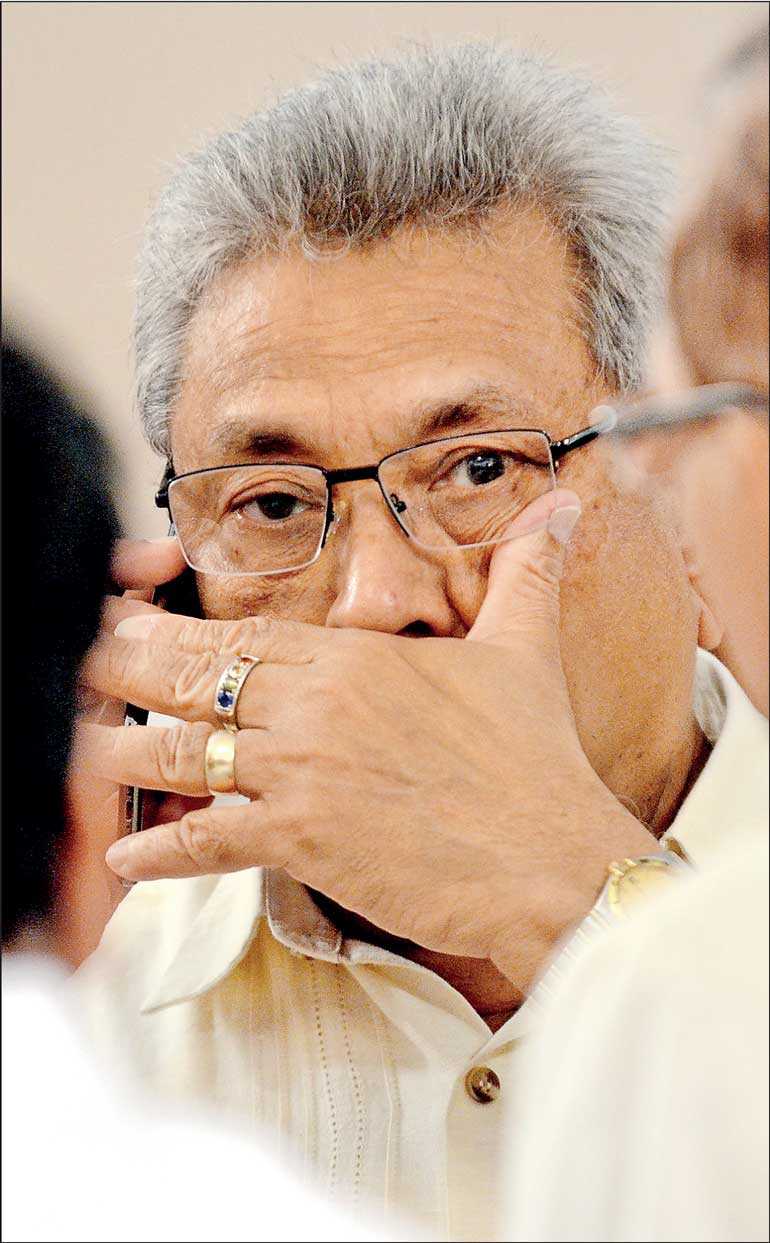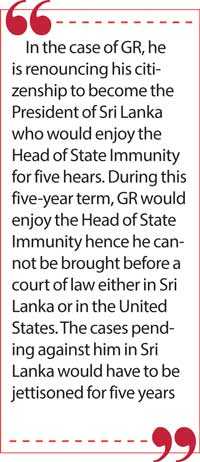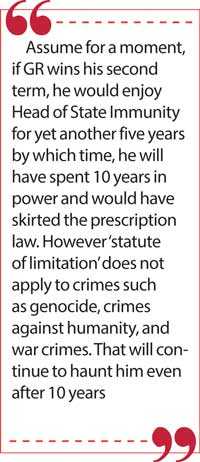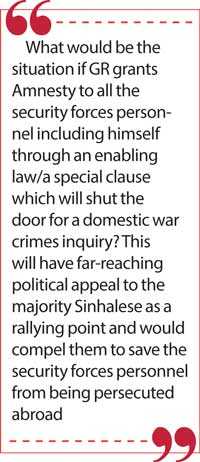Tuesday Feb 24, 2026
Tuesday Feb 24, 2026
Friday, 22 February 2019 00:00 - - {{hitsCtrl.values.hits}}

This writer is not a card-carrying member of any political party, neither does he have any affiliation to any of the  Rajapaksas either personally or officially. This article is purely a legal and political analysis of the stakes involved if Gotabaya Rajapaksa decides to contest the next Presidential election. The references to some of the stories are taken from the mainstream media.
Rajapaksas either personally or officially. This article is purely a legal and political analysis of the stakes involved if Gotabaya Rajapaksa decides to contest the next Presidential election. The references to some of the stories are taken from the mainstream media.
The media reports that GR is a citizen of the United States and that he is making a frantic effort to contest the next Presidential election from the Sri Lanka Podujana Peramuna – SLPP which is under the direction of the former President Mahinda Rajapaksa. GR has now taken the membership of SLPP and just a couple of days back confirmed his interest in running for the Presidential election. In ethics conduct is ‘end idealised’.
What are the common accusations level against the GR? According to media reports, he has been held responsible for the Avant-Garde case/misuse of public property, disappearances of journalists, assault on media institutions, killing of journalists, authorising the attack on the Welikada prison rioters, war crimes allegations and the alleged involvement in the procurement of MIG aircrafts.
Besides being a US Citizen, he has undergone training at a university in China on a grant/scholarship given by the Government of China. If he had held a US citizenship how could he have functioned as Defence Secretary of Sri Lanka? GR now wants to renounce his UScitizenship and the crux of the matter is that all these cases are still pending, no verdict has yet been pronounced – neither incriminating him nor exonerating him.
President Sirisena even set up a Presidential Task Force for the recovery of illegally acquired State assets and the media reports indicate that USGovernment has extended cooperation as it borders on money laundering. GR does have the ‘presumption of innocence’ before the Lady Justice. Some of the cases are being postponed either because the Judges have recused themselves for personal reasons or owing to some legal point. How will this be seen by a foreign observer?
US Government’s possible concerns/Statute of Limitations/Prescription
There have been some media reports that outgoing US Ambassador AtulKeshap has had a meeting with the Former President Mahinda Rajapaksa at which the Ambassador has expressed his displeasure over GR contesting the Election. Here the issue is GR is not an ordinary US citizen with a clean track record in public life.  An ordinary US citizen could renounce his citizenship either to get married to someone in another country or for some personal reasons.
An ordinary US citizen could renounce his citizenship either to get married to someone in another country or for some personal reasons.
In the case of GR, he is renouncing his citizenship to become the President of Sri Lanka who would enjoy the Head of State Immunity for five hears. During this five-year term, GR would enjoy the Head of State Immunity hence he cannot be brought before a court of law either in Sri Lanka or in the United States. The cases pending against him in Sri Lanka would have to be jettisoned for five years.
Let’s assume for a moment, if he has committed a tax offence or any other offence in the US, the US prosecutors will not be able to lead evidence against him for five years. Yet another assumption – if GR is sure of his presidential bid he could even purposely circumvent the US law and remain ensconced under Head of State Immunity. The writer has not looked into the US law on prescription, the time frame within which an action could be brought against a person. E
Even if GR renounces his US citizenship, and if Presidential bid fails, the US laws would still apply to him because the US has laws that have ‘extraterritorial reach’ irrespective of the nationality. The US laws have undergone radical reforms in the wake of the 9/11 incident. This includes criminal laws, powers of investigations, securities laws where prosecutions have been initiated on the basis of the extraterritorial reach of these laws. The US law enforcement authorities have often resorted to kidnapping suspects wanted for criminal investigations from foreign countries and brought them before US courts.
However US law enforcement authorities would not be able to touch GR once he has become the President of Sri Lanka on any violations of US law, if the evidence of which are unearthed only after he has become the President. This proves that GR’s presidential bid would surely be a dilemma for the US Government. The Head of State enjoys absolute immunity. He can even attend UN General Assembly without any fear of being arrested because Heads of State visiting New York are protected by a separate Immunity under United Nations Headquarters agreement with United States and UN Headquarters District in New York is inviolable for visiting Heads of State.
Assume for a moment, if GR wins his second term, he would enjoy Head of State Immunity for yet another five years by which time, he will have spent 10 years in power and would have skirted the prescription law. However ‘statute of limitation’ does not apply to crimes such as genocide, crimes against humanity, and war crimes. That will continue to haunt him even after 10 years.
years by which time, he will have spent 10 years in power and would have skirted the prescription law. However ‘statute of limitation’ does not apply to crimes such as genocide, crimes against humanity, and war crimes. That will continue to haunt him even after 10 years.
According to Rome Statute of International Criminal Court (ICC), it does not recognise the statute of limitations. Sri Lanka has not signed the Rome statutes hence it has no bearing. The US too has not ratified the Rome Statute hence the US nationals are prevented from being prosecuted at ICC. Given the above scenarios, it would be highly unlikely that the US Government would grant GR a procedural consideration for his application to renounce the US citizenship which an ordinary citizen would undergo.
The state department’s official position on renouncing citizenship by those who seek a public office in a foreign country states that ‘certain policy level positions may be inherently incompatible with retaining US nationality. Cases of this nature generally involve heads of state or foreign ministers. Except with respect to these positions, the Department will not typically consider employment in a policy-level position to lead to loss of nationality if the individual says that he or she did not intend to lose their US nationality and if the individual’s actions were consistent with the retention of US nationality.
Actions consistent with the retention of US nationality include, but are not limited to, travel on a US passport, voting in US elections, payment of US taxes, maintenance of a residence in the United States, etc. In any event each policy-level position case is fully evaluated on a ‘case-by-case basis’. So the criteria that defines ‘case-by-case basis’ is an administrative matter for the Department of State.
Will he grant a blanket Amnesty to security forces personnel?
What would be the situation if GR grants Amnesty to all the security forces personnel including himself through an enabling law/a special clause which will shut the door for a domestic war crimes inquiry? This will have far-reaching political appeal to the majority Sinhalese as a rallying point and would compel them to save the security forces personnel from being persecuted abroad.
How will this be seen by international community? Will this precipitate an international crisis over which Sri Lanka will receive a whacking at Geneva? Will the Separatist lobby have a feast in Geneva? Will Sri Lanka be hounded overseas under GR leadership once again? Will the image of Sri Lanka be tarnished once again? Will GR be able to manage the unfolding scenario overseas? Will GR be able to visit overseas countries with ease? 
If GR grants a blanket Amnesty, there will be other repercussions, the scholarships, overseas military training for armed forces and UN assignments for security forces personnel would be in jeopardy as international community would not sit idle by and would surely mount a campaign against Sri Lanka. The nature and the ferocity of such a campaign cannot be fathomed. It would be pertinent to remember the incident surrounding Mahinda Rajapaksa’s hiatus at Oxford Union, where he could not deliver the speech due to protest from pro-separatist lobby and the UK Government’s inability to provide security. Will there be similar occurrences targeting Rajapaksa family members whenever they visit overseas?
Though China and Russia would support Sri Lanka, it would be highly unlikely that India would support Sri Lanka given the current global power alignments. Will GR be able to govern the country only with the help of Russia and China without India being in the equation? Since there is an increased Chinese economic and strategic footprint in Sri Lanka, any undue tilt towards China, for further funds and other infrastructure projects, would cause yet another foreign policy dilemma for any GR-led government.
Basil must necessarily be the Foreign Minister – Congo precedent
Since GR faction is formed mainly of parties and personalities who have had nationalistic sentiments, any concessions to resolve the ethnic problem in Sri Lanka would be an uphill task. The overseas situation would remain so with threats to arrest regime actors under ‘universal jurisdiction’. The outgoing UN High Commissioner for Human Rights, Prince Zeid Al-Hussein emphasised that if there is no progress in accountability and transitional justice in Sri Lanka he would encourage Member States to explore the use of ‘universal jurisdiction’.
If foreign countries resort to exercising the ‘universal jurisdiction’ it would hamper the free movement of our brave security forces personnel who did a splendid service of defeating terrorism. The pro-separatist lobby would invoke the ‘universal jurisdiction’ to GR family members hence Basil Rajapaksa must necessarily hold the Minister of Foreign Affairs position, so that he could enjoy the absolute immunity – yet again this will have an impact on the BR’s US passport as stated above.
The customary international law determines the immunity of the Minister of Foreign Affairs. The immunity is granted to ensure the effective performance of his/her functions on behalf of the State of Sri Lanka. The functions of the Foreign Minister require frequent travel to other countries. The international law recognises him as a representative of the State solely by virtue of his office. The functions of a Foreign Minister are such that as long as he remains the Foreign Minister he enjoys absolute immunity from criminal jurisdiction and inviolability when he is abroad. This is now a settled matter in international law after Congo challenged Belgium at the International Court of Justice in The Hague.(Ref; Arrest Warrant of 11 April 2000, Democratic Republic of Congo vs. Belgium, decision rendered in 2002)
SLPP has not articulated its political position vis-à-vis ethnic issue
The SLPP has carefully avoided discussing any matter on how they would resolve the ethnic issue. The only plank on which they intend to ride the wave is on the Bond Scam and demonising the incumbent Government through sustained media attacks. There has not been any serious discussion with the political parties representing the Tamil community. Almost all the arguments are against a new constitution being adopted and near zero attitudes to reconciliation.
The SLPP is also fielding public figures who conduct regular media conference are ideologically ‘nationalistic’ hence with these type of individuals, it is highly unlikely that any concessions to ethnic issues could be expected. The country’s ethnic issue has become very polarised and more visible when the extreme views are manifested in the north and the same in the south.
Given the above scenarios, the choice of the Presidential candidate from SLPP must be a carefully thought through.
The country would be ungovernable if the right choice is not made in keeping with the requirement to ensure that Sri Lanka maintains foreign relations with all the countries. The incumbent Government has somehow managed to maintain that balance. Its achievements must not be reversed for narrow political gains. The call for a War Crimes Inquiry has to a great extent diluted since the incumbent Government took the reins of power. Will the separatist lobby intensify the fight against Sri Lanka politically which they could not do militarily? Will the West, if antagonised by domestic politics, review the ban on LTTE?
This game must be played very carefully not through emotional outbursts but through soft power in London, Brussels and Washington. Former President Mahinda Rajapaksa has made a public statement that he would not mind if war veterans are prosecuted for crimes which have no connections with war such as rape. At long last he has realised the importance of upholding the rule of law. However to win Tamil votes a clear message must be conveyed to the war-battered Tamil community that SLPP would support a new Constitution that would guarantee their dignity which would be on par with other communities. Let there be peace and harmony in this blessed land.
(The writer is a political commentator and holds an LL.M in International Commercial Law and a Post Graduate Diploma in Diplomacy and World Affairs.)